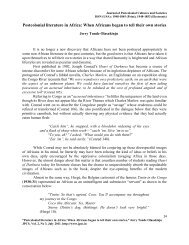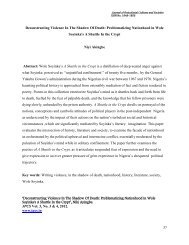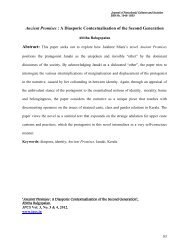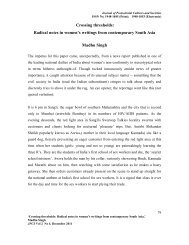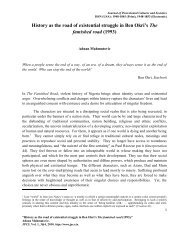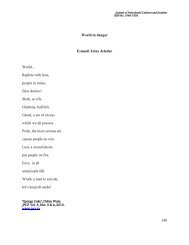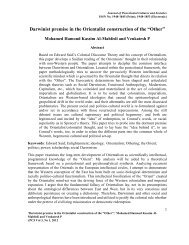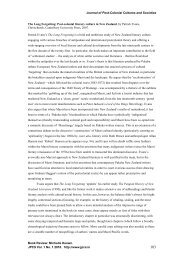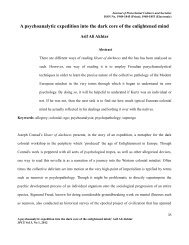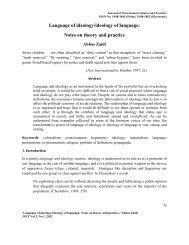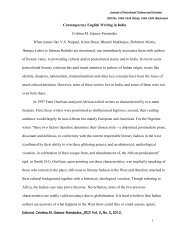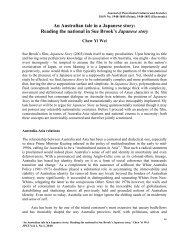The seeds of violence in domesticity: The case of post ... - JPCS
The seeds of violence in domesticity: The case of post ... - JPCS
The seeds of violence in domesticity: The case of post ... - JPCS
Create successful ePaper yourself
Turn your PDF publications into a flip-book with our unique Google optimized e-Paper software.
Journal <strong>of</strong> Postcolonial Cultures and Societies<br />
ISSN (USA): 1948-1845 (Pr<strong>in</strong>t), 1948-1853 (Electronic)<br />
Indian filmography. <strong>The</strong>se stories are set either <strong>in</strong> urban low-middle class (Fire, 1996), <strong>in</strong> the<br />
Bombayte urbanite milieu (Bhoot, 2003) or <strong>in</strong> the expatriate experience (Provoked, 2006;<br />
Videsh. Heaven on Earth, 2008). <strong>The</strong>y highlight <strong>violence</strong> <strong>in</strong> the domestic circle as a<br />
dispossess<strong>in</strong>g sign <strong>of</strong> refused or marg<strong>in</strong>alized belong<strong>in</strong>g, <strong>in</strong> a way that defers to an<br />
undist<strong>in</strong>guished tomorrow the supposed affability <strong>of</strong> national <strong>in</strong>clusion stated by Nehru.<br />
Post-colonial Indian identity relied and relies on the family cell, as the <strong>in</strong>terpreter <strong>of</strong><br />
accepted corporate behaviour and the guardian <strong>of</strong> authorized hierarchies. In the transition from<br />
the colonial period to the <strong>post</strong>-age <strong>of</strong> Independence whatever diasporic movement outside<br />
homogeneity and homologation acted around issues <strong>of</strong> unconscious mimicry, to symbolise the<br />
confusion caused by the mottled reality conceal<strong>in</strong>g beh<strong>in</strong>d the multicultural layers <strong>of</strong> the Indian<br />
world. This might be the <strong>case</strong> with Dharmaputra, a film <strong>in</strong> which transitions <strong>of</strong> identity from one<br />
community to another are frown upon. This theme is rehearsed <strong>in</strong> the many films concern<strong>in</strong>g<br />
assumed identities with<strong>in</strong> the domestic circle, whose closed frame generates cont<strong>in</strong>uous<br />
<strong>in</strong>timations <strong>of</strong> expulsion and discrim<strong>in</strong>at<strong>in</strong>g <strong>violence</strong>. <strong>The</strong> complex network imply<strong>in</strong>g both<br />
belong<strong>in</strong>g and refusal goes beyond the authority <strong>of</strong> the nation-state, s<strong>in</strong>ce it ma<strong>in</strong>ta<strong>in</strong>s the doma<strong>in</strong><br />
<strong>of</strong> the archaic (casteism, fundamentalism) with<strong>in</strong> the plea for modernity.<br />
Consequently, the power <strong>of</strong> the nation-state should be viewed as split between corporate<br />
authorizations and communal autonomies assert<strong>in</strong>g difference. <strong>The</strong> clash takes primarily place<br />
<strong>in</strong>side the domestic sphere, out <strong>of</strong> which arise the basic marks allow<strong>in</strong>g or forbidd<strong>in</strong>g the<br />
exchange across communities <strong>in</strong> terms <strong>of</strong> caste and religion. Khap panchayats with<strong>in</strong> villages<br />
and rural communities def<strong>in</strong>e the next step towards separation, <strong>in</strong> a bid to ma<strong>in</strong>ta<strong>in</strong> supposed<br />
specificity. On a higher level, the centrality and pan-Indianness <strong>of</strong> the political parties is<br />
nowadays crumbl<strong>in</strong>g down <strong>in</strong> terms <strong>of</strong> regionalism, casteism and religion. <strong>The</strong>se are provok<strong>in</strong>g<br />
micro-partitions with<strong>in</strong> the unified body <strong>of</strong> the Indian nation, from communalism to <strong>in</strong>surgency.<br />
Domestic control is no more sufficient to encapsulate corporate ethos with<strong>in</strong> safe channels <strong>of</strong><br />
unity <strong>in</strong> difference. <strong>The</strong> flaw perhaps lies <strong>in</strong> the imposition <strong>of</strong> corporate authority to domestic<br />
life, as a form <strong>of</strong> genetic heritage which cannot be changed, s<strong>in</strong>ce discrim<strong>in</strong>ates and makes the<br />
difference <strong>of</strong> Indian culture, <strong>in</strong> terms <strong>of</strong> nationalism and superiority.<br />
__________<br />
Biography<br />
Alessandro Monti is former Full Pr<strong>of</strong>essor <strong>of</strong> English Language and Literature and Head <strong>of</strong> the<br />
Department <strong>of</strong> Oriental Studies (University <strong>of</strong> Tur<strong>in</strong>, Italy). Visit<strong>in</strong>g Pr<strong>of</strong>essor at the Kakatya<br />
University (Warangal, A.P.), 2002, and Research Fellow (Indian Centre for Cultural Relations)<br />
with the Department <strong>of</strong> Journalism and Mass Communication, BHU, Varanasi), 2011: Research<br />
on Indian C<strong>in</strong>ema. He founded and edited till December 2010 the critical series DOST<br />
(Department <strong>of</strong> Oriental Studies <strong>in</strong> Tur<strong>in</strong>). He collaborates with several Indian publishers. He<br />
resigned from the University <strong>in</strong> September 2010.<br />
“<strong>The</strong> <strong>seeds</strong> <strong>of</strong> <strong>violence</strong> <strong>in</strong> <strong>domesticity</strong>: <strong>The</strong> <strong>case</strong> <strong>of</strong> <strong>post</strong>-Independence India,” Alessandro Monti<br />
<strong>JPCS</strong>, Vol. 2, No 3, July 2011. http://www.jpcs.<strong>in</strong><br />
85



